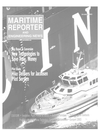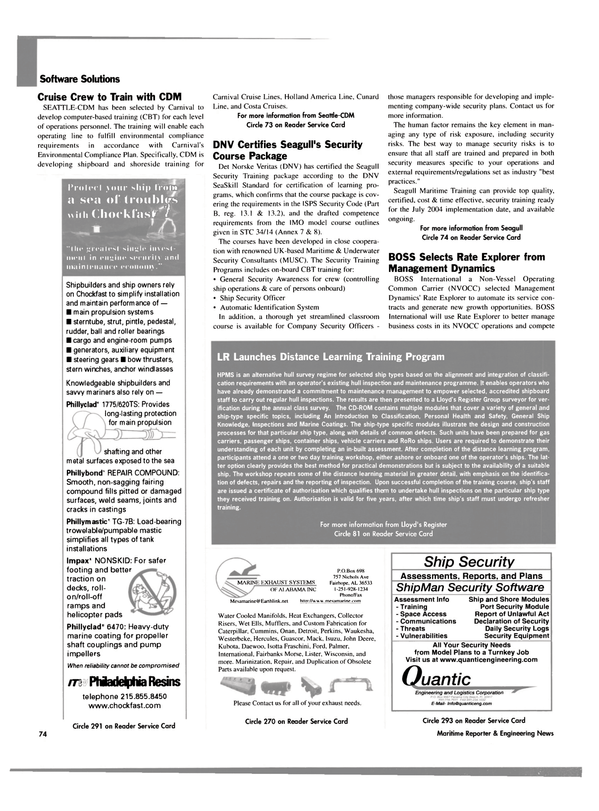
Urethane's Products Are Thick-Skinned
Proven in its field of monopile donut fenders, Urethane Products, based in Bellflower, Calif., provides Marine Guard Fenders Skin, which is a thick, tough protective polyurethane elastomeric skin material. Engineered by Urethane, this "skin" works as a capturing agent to hold the foam core of the fender. The skin is the reinforced with filament nylon tire cord - continuously wound in a helix pattern.
This method is used by Urethane because of its ability to significantly increase the tensile and tear strengths of the elastomer.
Designed to perform in some of the harshest weather conditions, the high strength fender skin distributes (through its reinforced skin) working energies and stresses throughout the fender skin. Urethane's donut fenders are carefully designed as to not scratch or mark-up vessels' hulls.
Getting to The Core Urethane's fender protection is based on foam and steel cores. With the internal foam core comprised of 100 percent closed cell, cross linked resilient, energy absorbing foam, the company's inner steel core is made of heavy duty steel is made of a skeleton whereby that same energy absorbing foam and now antifriction bearing pads are affixed.
The bearing surfaces between the donut fender and the pile thus permits the fender to rise and fall with the water level - rotating around the pile without binding. Shear forces are eliminated in the fendering system through these swift movements around the pile.
Additionally, the fender can be outfitted with a mooring crown, which allows vessels the ability to moor directly to the fender assembly, thus eliminating the need to adjust mooring lines and tides fluctuate.
Meanwhile, the foam core is a non-water absorbing material that is designed and constructed to yield maximum strength and consistent performance. In addition, no adhesive is used in the foam core, which can sometimes break down under heavy or prolonged use.
Lab Tested = Urethane Approved Marine Guard foam fenders have stepped up to the plate and have come out on top following tough quality and performance tests provided for Urethane via independent testing labs. Therefore all Urethane products are designed to meet the most stringent quality control methods, which are designed according to the requirements of the U.S.
Military Quality Assurance Specification MIL-I-45208. That is why in times of imminent danger, Urethane's fenders always rise to the occasion.
According to the company, its Marine Guard Floating Monopile Donut Fender is especially useful in areas with large tidal fluctuations.
The donut fender's unique design allows it to rotate and rise and lower (see inset photo above) with the tidal change, providing optimal fendering at all tide levels .
This unique feature of the donut fender allows for a smooth berthing for passenger ferries — a situation where customer comfort is paramount.
Applications include: • Dock fendering in areas of large tidal swings; • Turning dolphins; • Breasting Dolphins; • Corner Protection; • Bridge Protection; • Ferry Terminals; • Dry Docks; Features include: • High Energy Absorbing; • Low Reaction Forces; • Low Shear Force System; • Hull Conforming; • Burst Resistant; • Easy Installation; • Low Maintenance; • Custom and Versatile Designs Additionally, UPC donut fenders absorb a high level of energy while exerting a low reaction force. This berthing energy is absorbed by a combination of the donut fender internal foam core and the deflection of the pile.
Circle 327 on Reader Service Card
Read Urethane's Products Are Thick-Skinned in Pdf, Flash or Html5 edition of October 2003 Maritime Reporter
Other stories from October 2003 issue
Content
- Blount Delivers 130-ft. CAT page: 10
- 10,850-HP AHTS Joins Seabulk Offshore Fleet page: 11
- Sibu: Ferries for Asia page: 12
- Grimaldi-Naples Launches RoRo Grande Amburgo page: 14
- U.S. Territorial Sea and Other Lines in the Water page: 16
- Varian, PARC Receive Security System Funding page: 22
- Wartsila to Concentrate on Marine and Service page: 22
- LPG Tanker Repaired, Modernized and Converted page: 24
- Financier Calls for a New Approach on Standards page: 26
- Bollinger Completes Major Conversion of Ned Ferry page: 27
- SENESCO Becomes Senesco Marine page: 28
- SPS Overlay: Fix Steel Decks Faster page: 30
- Team UMC Helps Navy Ship With Innovative VSP Switch page: 33
- B+V Reports Busy Repair Docks in August page: 34
- Extensive Fantasy Refurb page: 35
- New Tooling, Training Solutions Target Shipbuilding page: 36
- Dubai Drydocks Completes Conversions page: 38
- Solutions in Panama page: 38
- Insurer Not Liable for Repairs Beyond Warranty page: 39
- The Evolution of Marine Painting page: 40
- Grand Bahama Shipyard Receives Quality Mark page: 41
- Brunei Develops New Coating System page: 42
- New Marine Technology Set for Debut at Amsterdam Exhibition EURO PORT 2003 page: 46
- Gesilco: Built to last page: 48
- Radio Holland page: 51
- Nauticast AG page: 51
- Autoship Continues To Make Waves page: 54
- Maxsurf Links with ShipConstructor page: 54
- Provide Solutions Introduces 3D Laser Scanning page: 56
- Nupas-Cadmatic Offers Versatile Shipbuilding Applications page: 57
- ABS President Discusses Bulk Carrier Safety page: 58
- Integrity in a New Era page: 60
- More Power to the Dredgermen page: 60
- CNG Carrier One Step Closer page: 61
- JJMA on LSC Team page: 63
- A Legacy Spanning Three Generations page: 64
- World Maritime Tech Exhibition Set for San Francisco page: 66
- Juniper's Hinges Go Low and High page: 68
- Long Beach Pilots Go Far Out With New Boat page: 72
- Urethane's Products Are Thick-Skinned page: 76
- SES Launches "Smart" Solution page: 77
- BP's Shafts are Oil-Free page: 80
- Vosta Debuts Universal MK3 Bow Coupling Installation page: 81
- Safety Not Optional page: 81
- VENTIQ Offers Innovative Approach to Cargo Tank Venting page: 82
- Walform M Plus: Leak Free pipe connections page: 82
- Employees' Invention Improves Valve Process page: 83
- New High-Pressure Pumps page: 83


